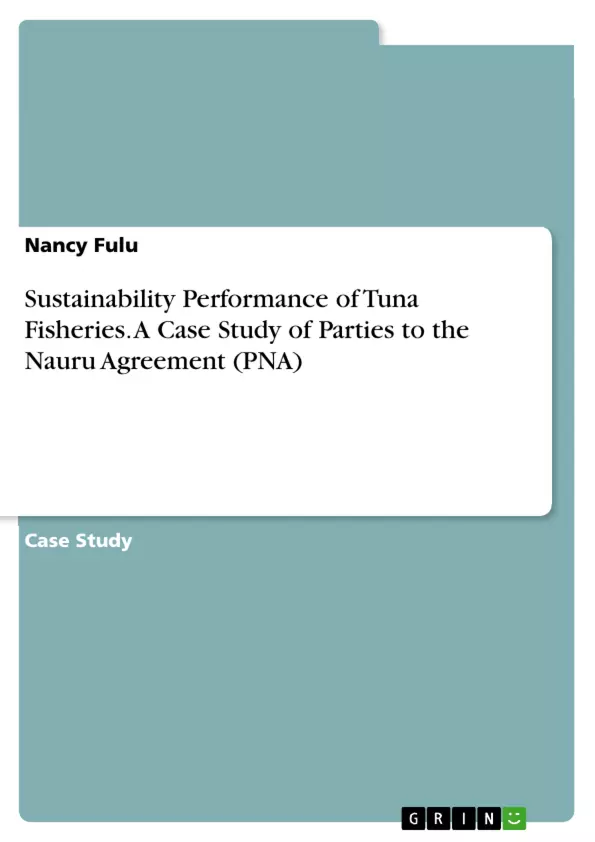Sustainable fishing in the Pacific Island nations is faced with a big problem because of illegal fishing and overfishing. The small island nations of the central Pacific have an awful lot of ocean and marine resources and face the problem of illegal fishing and overfishing in their waters. As a result, the eight island nations known as the Parties to the Nauru Agreement (PNA) countries signed an accord in 1982 to control an area of ocean about 40% bigger than the whole of Europe or the USA. Fishing is a major source of economic revenue for the PNA countries, and without it, they would not be able to earn revenue, and this would be a threat for the food security for the Pacific countries.
This case represents the kind of problem that Garrett Hardin referred to in a famous discussion of the "tragedy of the commons". In the case of the PNA countries, the commons are the ocean and its resources, where people get fish and other marine resources. People use their freedom of access to these commons to maximize the marine resources and the fish for their personal economic gains. They resort to unlawful fishing and overfishing which leads to exploitation and pollution of the oceans. In the worst case they can permanently damage the commons – the ‘tragedy’ that Hardin referred to. People need to be aware of the problem and they will consent if they understand the consequence of overfishing as much as they want by their own choice. Hardin thought that communities could not solve the problem and that private ownership or government control was needed. Elinor Ostrom, among others, found many cases where communities were able to solve the problem on their own. More importantly, Elinor Ostrom tried to understand why some people can solve the problem and why some people cannot solve the problem. Ostrom and others started research on the question of when and how the
‘tragedy of the commons’ problem can be solved.
Related to this, the PNA is an important case. The PNA countries faced the same 'tragedy of the commons' problem, but the PNA countries have been more successful in solving it, at least so far. Also, the PNA decided to stop the overfishing of bigeye tuna but instead the delegates discussed the limit of overfishing to be allowed instead of ending it.
Inhaltsverzeichnis (Table of Contents)
- Acknowledgement
- Abstract
- Key Words
- List of Tables
- List of figures
- CHAPTER 1
- Introduction
- Background and Statement of the problem
- Purpose, rational and objectives
- Significance and expected contribution
- CHAPTER 2
- Literature review
- Research Question and Hypothesis
- CHAPTER 3
- Methods
- CHAPTER 4
- Results
- CHAPTER 5
- Discussion
- Conclusion
- Limitations and Suggestions
- REFERENCES
- APPENDIX
Zielsetzung und Themenschwerpunkte (Objectives and Key Themes)
This thesis examines the sustainability performance of tuna fisheries in the Parties to the Nauru Agreement (PNA) region. It explores the factors that contribute to the PNA’s success in managing tuna resources sustainably. The study aims to provide insights into the PNA's approach to sustainable fisheries management and its applicability to other regions.
- Sustainability performance of tuna fisheries in the PNA region
- Factors contributing to PNA's successful fisheries management
- Application of the Ostrom framework to the PNA's success
- The importance of culture, unity, and strong leadership in sustainable fisheries management
- The role of technological aid and support from partner organizations
Zusammenfassung der Kapitel (Chapter Summaries)
Chapter 1 introduces the topic of tuna fisheries sustainability in the PNA region, outlining the problem of overfishing and its impact on island economies. The chapter also defines the study's objectives and rationale.
Chapter 2 presents a literature review examining existing research on sustainable fisheries management, focusing on the Ostrom framework and its relevance to the PNA's approach.
Chapter 3 details the methodology employed in the study, including the data collection methods and analysis techniques used to investigate the success factors of the PNA’s fisheries management.
Chapter 4 presents the results of the study, analyzing the factors that contribute to the PNA's sustainability performance and highlighting key findings from the data collected.
Chapter 5 discusses the findings in detail, relating them to existing literature and exploring the implications of the PNA's approach for other fishing regions.
Schlüsselwörter (Keywords)
This thesis focuses on the key terms of sustainability, the Ostrom Framework, tuna fisheries in the Pacific Ocean, and the Parties to the Nauru Agreement (PNA). The study analyzes how the PNA’s success in sustainable tuna fishing relates to the Ostrom framework and its principles. The key focus is on the effectiveness of community-based approaches to fisheries management.
- Quote paper
- Nancy Fulu (Author), 2022, Sustainability Performance of Tuna Fisheries. A Case Study of Parties to the Nauru Agreement (PNA), Munich, GRIN Verlag, https://www.grin.com/document/1481625



